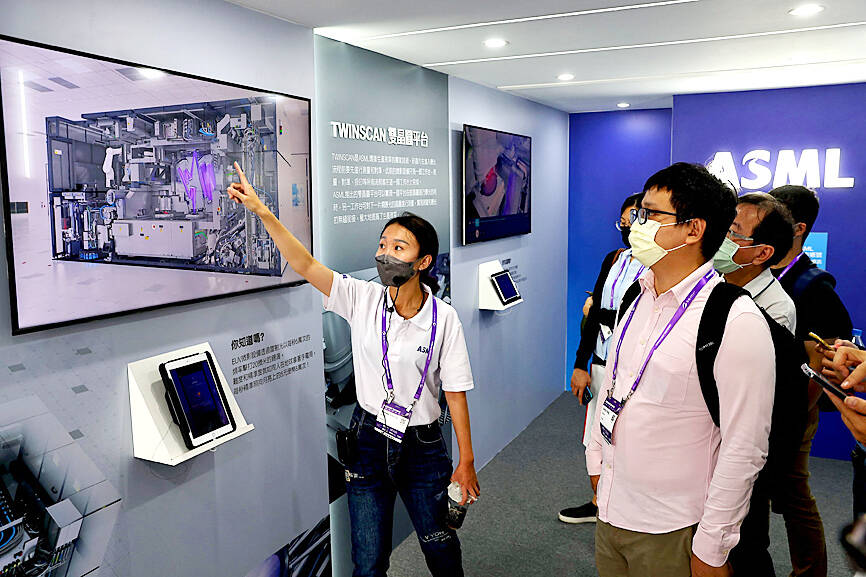US Secretary of Commerce Gina Raimondo had a sobering message for US makers of chipmaking equipment this week: You will need to wait as long as nine months before Washington can reach an accord with US allies over strict new rules aimed at restricting China’s access to certain technologies.
The US is working on an agreement that would make companies in the Netherlands and Japan — home to some of the biggest makers of chipmaking gear — subject to limits on sales of such equipment to China.
US companies are already bound by the export controls, which they say would cost them billions of US dollars in revenue even as their main competitors in Europe and Japan face fewer limits on China sales.

Photo: Ann Wang, Reuters
Reaching the accord, aimed at leveling the playing field, could take six to nine months, Raimondo told representatives of the US companies, according to people with direct knowledge of the meeting.
Washington announced a new round of export control rules on Oct. 7 to limit China’s access to advanced chips and semiconductor-manufacturing equipment made with US technologies.
Raimondo made the comments when she met on Wednesday with representatives from equipment makers, including Lam Research Corp and KLA Corp, said the people, who requested anonymity discussing a non-public interchange.
US DOMINANCE
The global chip-production equipment market is dominated by US companies Lam, KLA and Applied Materials Inc, as well as ASML Holding NV in the Netherlands and Japan’s Tokyo Electron Ltd.
Currently, the non-US suppliers have more latitude in doing business with China.
For the US triumvirate, restrictions on what their overseas competitors can ship to China cannot come fast enough.
Applied Materials, Lam and KLA have told investors that the new export control measures would cut into their revenue. The risk for them is that — until the restrictions apply in a more even-handed way — foreign peers would win market share in China, generating added revenue that in turn can be plowed into developing new products.
While the overall market for chipmaking gear is forecast to shrink next year, analysts project that the three US companies would suffer steeper revenue declines than their Japanese counterpart.
PRESSURING ALLIES
Washington is now preparing to amp up pressure on allies to block chip gear sales to China. Senior US National Security Council official Tarun Chhabra and Under Secretary of Commerce for Industry and Security Alan Estevez are scheduled to travel to the Netherlands for discussions on China-chip curbs later this month, Bloomberg News has reported, although no deal is expected to come out of the talks.
Estevez last week said that he expects a deal with allies to be reached in the near term.
He said he wants rules for US companies to be “fair with their competition across the globe, and it’s fair for their competition with each other.”
He added that he and other officials, such as National Security Adviser Jake Sullivan and Raimondo, are talking to allies about the issue.

RECYCLE: Taiwan would aid manufacturers in refining rare earths from discarded appliances, which would fit the nation’s circular economy goals, minister Kung said Taiwan would work with the US and Japan on a proposed cooperation initiative in response to Beijing’s newly announced rare earth export curbs, Minister of Economic Affairs Kung Ming-hsin (龔明鑫) said yesterday. China last week announced new restrictions requiring companies to obtain export licenses if their products contain more than 0.1 percent of Chinese-origin rare earths by value. US Secretary of the Treasury Scott Bessent on Wednesday responded by saying that Beijing was “unreliable” in its rare earths exports, adding that the US would “neither be commanded, nor controlled” by China, several media outlets reported. Japanese Minister of Finance Katsunobu Kato yesterday also

Jensen Huang (黃仁勳), founder and CEO of US-based artificial intelligence chip designer Nvidia Corp and Taiwan Semiconductor Manufacturing Co (TSMC, 台積電) on Friday celebrated the first Nvidia Blackwell wafer produced on US soil. Huang visited TSMC’s advanced wafer fab in the US state of Arizona and joined the Taiwanese chipmaker’s executives to witness the efforts to “build the infrastructure that powers the world’s AI factories, right here in America,” Nvidia said in a statement. At the event, Huang joined Y.L. Wang (王英郎), vice president of operations at TSMC, in signing their names on the Blackwell wafer to

‘DRAMATIC AND POSITIVE’: AI growth would be better than it previously forecast and would stay robust even if the Chinese market became inaccessible for customers, it said Taiwan Semiconductor Manufacturing Co (TSMC, 台積電) yesterday raised its full-year revenue growth outlook after posting record profit for last quarter, despite growing market concern about an artificial intelligence (AI) bubble. The company said it expects revenue to expand about 35 percent year-on-year, driven mainly by faster-than-expected demand for leading-edge chips for AI applications. The world’s biggest contract chipmaker in July projected that revenue this year would expand about 30 percent in US dollar terms. The company also slightly hiked its capital expenditure for this year to US$40 billion to US$42 billion, compared with US$38 billion to US$42 billion it set previously. “AI demand actually

RARE EARTHS: The call between the US Treasury Secretary and his Chinese counterpart came as Washington sought to rally G7 partners in response to China’s export controls China and the US on Saturday agreed to conduct another round of trade negotiations in the coming week, as the world’s two biggest economies seek to avoid another damaging tit-for-tat tariff battle. Beijing last week announced sweeping controls on the critical rare earths industry, prompting US President Donald Trump to threaten 100 percent tariffs on imports from China in retaliation. Trump had also threatened to cancel his expected meeting with Chinese President Xi Jinping (習近平) in South Korea later this month on the sidelines of the APEC summit. In the latest indication of efforts to resolve their dispute, Chinese state media reported that